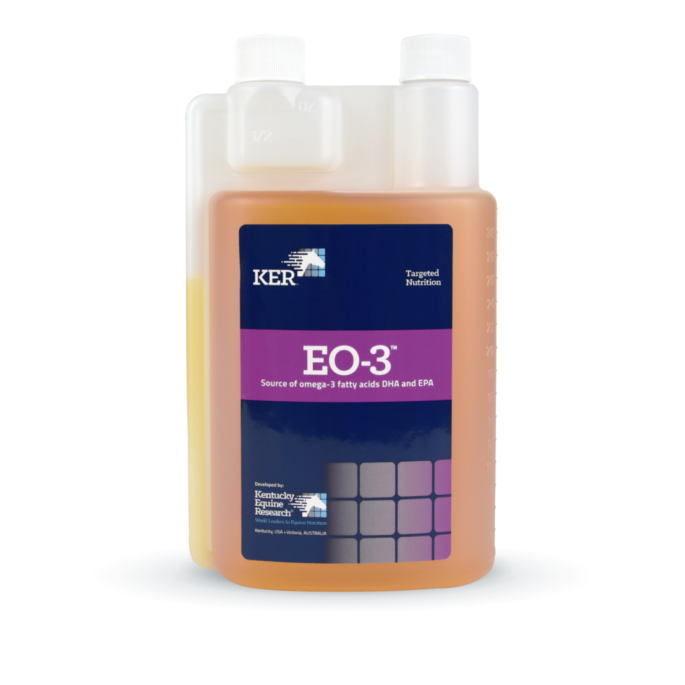The Benefits Of Feeding Omega-3 Fatty Acids
The starting point to keep any horse healthy is to ensure a well-balanced diet that is suited to that individual horse, with forage, most importantly, forming the basis of the diet. The rest of the diet needs to ensure suitable energy; quality protein; vitamin and mineral levels are available to keep the horse fit and healthy, but there are also further dietary additives to consider to promote optimal health in our horses and ponies. Adding omega-3 fatty acids to the diet has benefits that include anti-inflammatory effects, reproductive benefits, immune and bone benefits.
EFFECTS OF FEEDING OMEGA-3 FATTY ACIDS -

EFFECT ON STRIDE LENGTH -
Researchers at Michigan State University measured stride length at the walk and trot for 18 Arabian horses. The horses were paired, and all of the horses were fed a concentrate feed and Timothy hay. One horse in each group was supplemented with fish oil while the other was supplemented with corn oil for a period of 75 days. The horses were exercised five days a week under saddle or on a lunge line. At the end of the trial the horses supplemented with the fish oil had higher plasma levels of omega-3 fatty acids. There was no change in stride length at the walk, but horses supplemented with the fish oil tended to have an increased stride length at the trot. The increased stride length in the trot suggests a decrease in inflammation, stiffness and joint pain associated with movement.
BENEFITS FOR JOINT INFLAMMATION -
Researchers at Texas A&M University have reported that supplementation with omega-3 fatty acids reduced joint inflammation in both yearlings and arthritic horses. Horses fed the omega-3 supplement had lower synovial fluid white blood cell counts than those in the control group. Raised white blood cell counts are indicative of local inflammation and arthritic horses will typically have a much higher number of white blood cells than non-arthritic horses – therefore the reduced quantity observed in this study suggests that the omega-3 supplementation reduced joint inflammation.
BENEFITS FOR SKIN IRRITATION -
It has been shown that diets high in omega 3 fatty acids can help to increase the elasticity of the skin cells which is of great benefit for horses that are suffering from forms of skin irritation. Omega-3 fatty acids have also been shown to reduce inflammation, which may help reduce the effect of many common forms of skin irritation.

BENEFITS FOR METABOLIC CONDITIONS –
A study by Hess et al., 2013 investigated marine derived omega-3 supplementation in 21 insulin dysregulated mares. In the treated groups the insulin dysregulated mares all showed an increase in insulin sensitivity. This suggests that a marine derived fish oil could be a useful tool in managing metabolic dysfunction, as it helps to improve insulin sensitivity and reducing inflammation in horses with metabolic syndrome.
THE DIFFFERENCE BETWEEN OMEGA-3 AND OMEGA-6 FATTY ACIDS –
Omega-3 and omega-6 fatty acids are essential fatty acids meaning they cannot be made by the horse and must be supplied in the ration. Each fatty acid is necessary for the production and distribution of prostaglandins, however the prostaglandins from omega-3 and omega-6 fatty acids have different effects on inflammation processes in the body. In simple terms, we consider omega-3 fatty acids to be anti-inflammatory, and omega-6s to be pro-inflammatory. This is because the inflammatory response from cytokines and prostaglandins that originate from omega-3 fatty acids is moderate compared to the response from cytokines and prostaglandins derived from omega-6s. Therefore, the ratio of these fatty acids must be balanced within the body to be effective.
These essential fatty acids cannot be made by the horse and therefore must be supplied in the ration.

OMEGA 3 FATTY ACIDS SUPPLEMENTATION-
Kentucky Equine Research developed EO-3™, a potent marine-derived oil that is rich in omega-3 fatty acids. EO-3 is a palatable oil that is top-dressed onto the feed. EO-3 contains the omega-3 fatty acids DHA and EPA. KER has shown EO-3 to be highly palatable when compared to other marine-derived oils. EO.3™ is a more readily available source of omega-3’s to the horse than linseed or vegetable oil is and is therefore more effective. The form of omega 3 oil that is in vegetable oil has to be converted in the horse's body into the form that can be used. The omega 3 oil that is in fish oil is already in the form the horse can use so does not need to be converted, making it more bio-available.
Feed Advice Form
Complete our online form to receive a detailed nutritional plan for your horse or pony from one of our registered nutritionists.
Quick Feed Finder
Use our quick and easy feed finder as a guide to select the right feed for your horse or pony.












